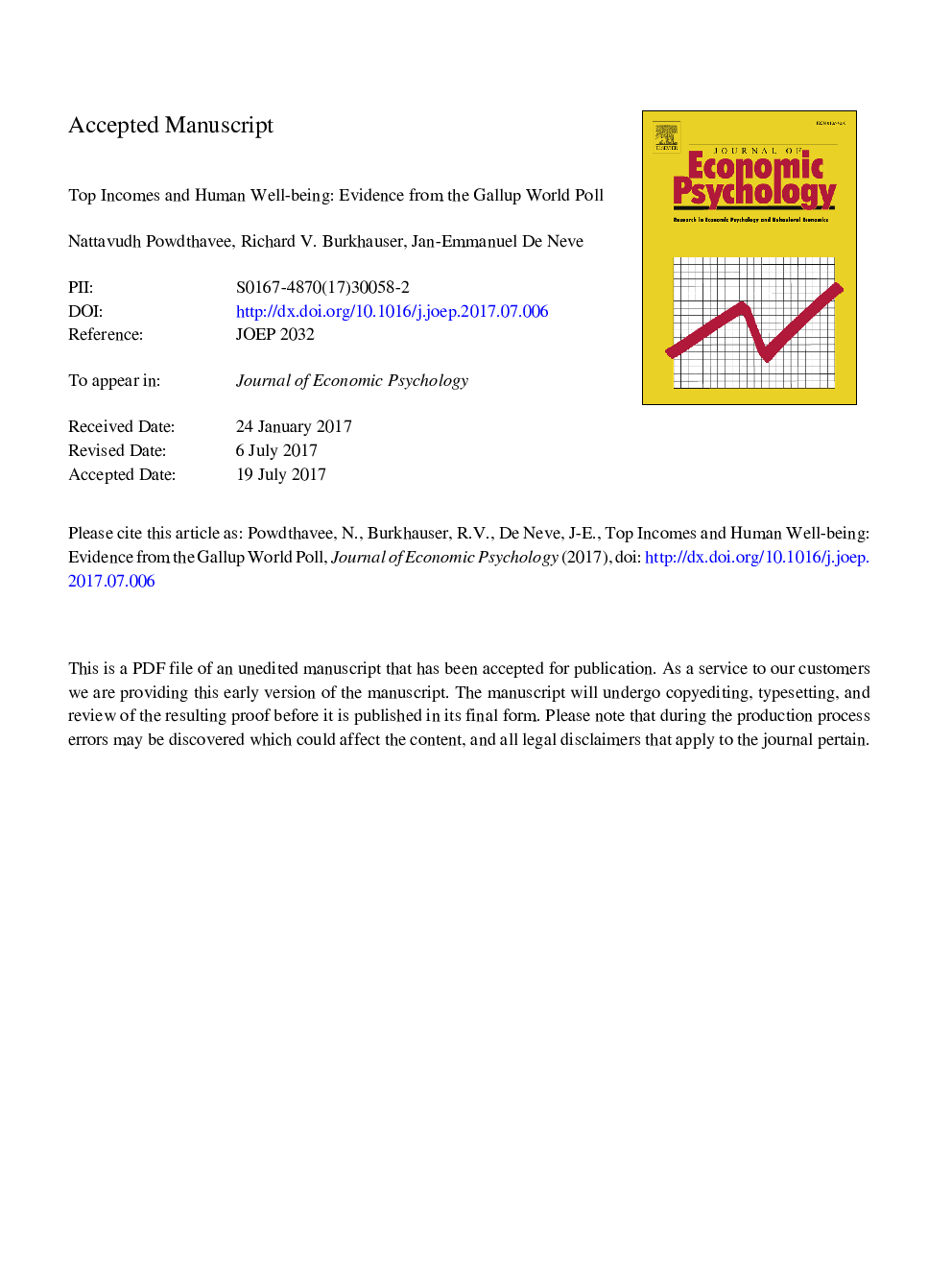| کد مقاله | کد نشریه | سال انتشار | مقاله انگلیسی | نسخه تمام متن |
|---|---|---|---|---|
| 5034739 | 1471704 | 2017 | 35 صفحه PDF | دانلود رایگان |
عنوان انگلیسی مقاله ISI
Top incomes and human well-being: Evidence from the Gallup World Poll
ترجمه فارسی عنوان
درآمد بالا و رفاه انسان: شواهدی از نظرسنجی جهانی گالوپ
دانلود مقاله + سفارش ترجمه
دانلود مقاله ISI انگلیسی
رایگان برای ایرانیان
ترجمه چکیده
سهم درآمد 1 درصد در بسیاری از کشورهای جهان بیش از 30 سال گذشته افزایش یافته است. اما ما همچنان کمی درباره رابطه بین افزایش درآمد بالای درآمد و رفاه بشری زندگی می کنیم. با استفاده از داده های 24 کشور و سال های 2005 تا 2013 در نظرسنجی جهانی گالوپ و پایگاه اطلاعات درآمد جهانی، این مطالعه رابطه بین سهم درآمد بالا و ابعاد مختلف سلامت ذهنی را بررسی می کند. نتایج منفی با رابطه منفی بین سهم درآمد بالا و متوسط نردبان زندگی به طور عمده توسط زیر نمونه اروپایی رانده شده است. برای کشورهای اروپایی، ما همچنین شواهدی را نشان می دهیم که درآمد سرانه به طور قابل توجهی با بهره وری پایین تر ارتباط برقرار می کند و روز به روز خوب استراحت می کند و دیروز متوسط و شدید استرس و ناراحتی. به طور کلی، یافته های ما نشان می دهد که حداقل برای افراد در اروپا، یک سیاست اقتصادی که باعث افزایش درآمد ملی می شود، ممکن است تأثیر قابل ملاحظه ای بر تمایلات ارزیابی را داشته باشد، در صورتی که تنها سهم درآمد را در بالای توزیع درآمد افزایش می دهد. به طور کلی، نتایج ما روابط پیچیده بین نابرابری درآمد و سلامت ذهنی در کشورهای مختلف را نشان می دهد.
موضوعات مرتبط
علوم انسانی و اجتماعی
مدیریت، کسب و کار و حسابداری
بازاریابی و مدیریت بازار
چکیده انگلیسی
The share of income held by the top 1 percent in many countries around the world has been rising persistently over the last 30Â years. But we continue to know little about the relationship between the rising top income shares and human wellbeing. Using data from 24 countries and years ranging from 2005 to 2013 in the Gallup World Poll and the World Income Database, this study examines the relationship between top income share and different dimensions of subjective wellbeing. The results are mixed, with the negative relationship between top income shares and average life ladder being driven largely by the European sub-sample. For the European countries, we also document evidence that top income is statistically significantly associated with lower average enjoyment and being well-rested yesterday, and higher average stress and sadness yesterday. Overall, our findings suggest that, at least for individuals in Europe, an economic policy that increases national incomes may have significant crowding-out effect on aggregate evaluative wellbeing if it only increases the share of income at the very top of income distribution. More generally, our results highlight the complex relationships between income inequality and subjective wellbeing across different countries.
ناشر
Database: Elsevier - ScienceDirect (ساینس دایرکت)
Journal: Journal of Economic Psychology - Volume 62, October 2017, Pages 246-257
Journal: Journal of Economic Psychology - Volume 62, October 2017, Pages 246-257
نویسندگان
Nattavudh Powdthavee, Richard V. Burkhauser, Jan-Emmanuel De Neve,
